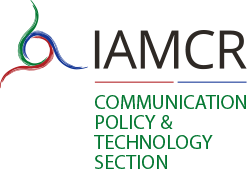
The Communication Policy and Technology Section is pleased to announce the recipients of its two best paper awards for 2019.
This year, we decided to award the CP&T Emerging Scholar Best Paper Award to an exceptionally promising young researcher for a paper submitted in advance of the conference which best represents the balance of theory, research, writing and policy engagement that we welcome in the tradition of CP&T; and the CP&T Internet Policy Review Award which meets the above criteria and, in addition, makes a significant contribution to the field of internet policy research.
Please find below some details on both papers and their authors. Please join us in congratulating them!
The 2019 CP&T Emerging Scholar Best Paper Award
“Algorithmic selfie: on the right to assess algorithmic identity and exercise right of access”, by Ana Pop Stefanija, Vrije Universiteit Brussel, Belgium.
This paper can be best described as an exercise in research methodology and research in exercising rights. Exploring and experimenting with different approaches, methods and tools, its first aim is to propose and test a methodology for investigating datafication practices and algorithmic identity and transparency by employing the approaches of letting the software speak and making the software speak. In doing so, it investigates the objects of study both at an interface and software level. The second aim is to investigate paths to access and assess an algorithmic identity using the affordances of platforms, transparency tools and the GDPR's Article 15. In that sense, the paper repurposes these regulatory and transparency tools as objects of/for study, assessing their applicability both for research and for user empowerment. As such, it contributes significantly towards better understanding of the affordances and limitations of, first, adopting a practical transparency (Paßmann and Boersma, 2017) approach and, second, of the regulatory tools already in place.
Ana Pop Stefanija is a PhD researcher at imec-SMIT, Vrije Universiteit Brussel. Interested in algorithmic transparency, explainability and accountability, her research focuses on investigating avenues and approaches for both studying algorithms and achieving transparency at a system, user and (potentially) policy level. Being closely related with the concept of trustworthiness, the research tackles upon the crucial issue of conditions and requirements for trust when delegating decision-making to algorithmic systems. While working on the paper Ana was a scholarship holder and student at the Erasmus Mundus Joint Master Degree programme in Digital Communication Leadership, financed by the European Union.
The 2019 CP&T Internet Policy Review Award
The CP&T Internet Policy Review award is part of CP&T’s partnership with the Internet Policy Review journal launched in 2018. For more information, see here.
“How organizations exercise their responsibility to prevent harmful online communication”, by Sora Kim, Chinese University of Hong Kong, and Sabine Einwiller, University of Vienna, Austria.
This paper examines how online content providers (OCPs) exercise their responsibility in dealing with harmful online communication (HOC) by moderating user-generated content. Empirical research was conducted through a content analysis of HOC policies shared by OCPs on their sites and interviews of OCP representatives regarding how these policies are implemented in content moderation. Research objects were OCPs from the U.S., Germany, South Korea, and China. Results show that HOC policies are often discussed in the context of legal aspects through terms of service. This implies that OCPs could be more vigorous in proactively addressing this pressing issue through clearer communication or better educating users. The most common organizational actions against HOC mentioned on the platforms are deleting posts or blocking account holders—both of which are rather reactive measures. The interviews reveal sensitive issues regarding actual implementations of such reactive actions. Most interviewees, except those from China, noted being cautious against accusations of censorship, acknowledging the tension between free speech and their content moderation practice. What emerged as the “gold standard” for decisively identifying HOC was manual inspection. What was most common as an initial filtering method, though, among large operators was machine-learning technology or artificial intelligence.
Sora Kim is an associate professor in the School of Journalism and Communication at the Chinese University of Hong Kong. She earned her PhD in Communication from the University of Tennessee. Her research focuses on corporate social responsibility communication and crisis communication.
Sabine Einwiller is a professor in the Department of Communication at the University of Vienna, Austria. She holds a doctorate degree in business adminstration from the University of St. Gallen (Switzerland) and a master's degree in Psychology from the University of Mannheim (Germany). Sabine’s research focuses on the effects of negative publicity and crisis communication, CSR communication, and consumer-company communication in social media.